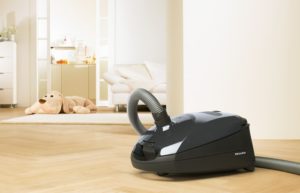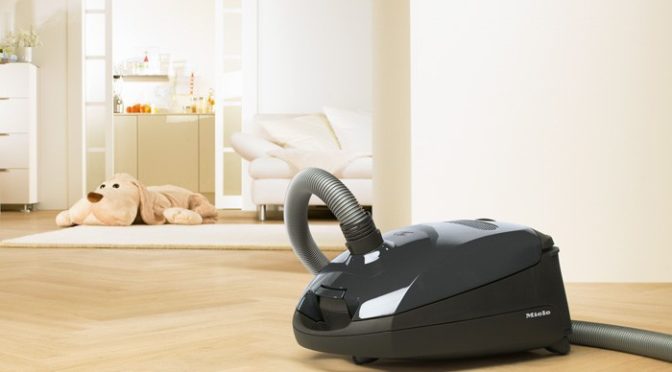
Although the Miele Classic C1 Capri is no longer in production, it remains one of the cheapest paths of entry to owning a Miele canister vacuum. Miele decided they wanted more money, and rolled out the C3 canister line, whose cheapest members, the Alize and Calima, start at around $650, as well as the Compact C2 Electro+, which is barely cheaper at $600. Granted, they also threw middle class families a bone with the Compact C1 Turbo and Compact C1 Pure Suction, which cost around $400 and $300 respectively. However, are any of these vacuums really better than the Capri or its C1 sibling, the Classic C1 Delphi? We set out to answer this and other frequently asked questions while comparing the Capri to newer, but not necessarily better Miele canisters. Read on to learn what we learned!
Which dust bags and filters does the Capri take and when do they need to be changed?
The Capri, like all Classic C1 canisters, takes GN-sized dust bags; you’ll want to buy the Miele GN Airclean 3D Efficiency Dust Bag, which contains four dust bags, an air filter, and a motor filter in each box. Buy several so you aren’t stuck waiting for extras to ship when your starter bag gets full. The dust bags are replaced when full and the motor filter is changed after every four bags. Ditch the cheap air filter for the Miele HEPA AirClean SF-HA 50; it provides HEPA filtration for 50 hours of vacuuming, or 12 months of normal use, before it needs changing.
Between the Capri and the Delphi, which is a better deal for a house with carpeting and hardwood floors?
Both are good vacuums, as we’ve noted in our reviews of both. If you have hardwood floors, low-pile, and medium-pile carpeting, save the extra hundred dollars and get the Capri; it includes a turbo brush head for carpets and a Parquet head for bare flooring. While the turbo head won’t clean as effectively as the electric brush head on the Delphi, it will still clean your carpets as long as they aren’t high-pile carpets. If you do have high-pile carpeting or simply a lot of carpeting, the Delphi is the better deal; the brush head is stronger and will make vacuuming a more pleasurable experience.
How does the Capri compare to the Electro+? Is the Electro+ worth the extra $200?
Whether or not the Electro+ is worth the extra $200 will depend on the degree to which you’d like an electric brush head and a smaller and lighter canister. The Electro+ will clean, for all intents and purposes, like the Delphi or Titan, but it will cost $100 more than the Delphi and cost just as much as the Titan. If you don’t have a lot of carpet or do have some carpet but don’t have high-pile carpeting, then you can get away with the Capri instead of with the Electro+.
Can you add an electric brush head to the Capri later on? If not, which Mieles come with electrobrushes?
No; this is one of the unfortunate facts of life with modern Miele canisters. If they don’t come with electric brush heads from the start, you can’t add them later the way you can add Parquet heads and turbo brush heads because the electric heads, being powered, require a powered connection on the telescoping wand, which is only included on Mieles that originally shipped with electrobrushes. In the C1 line, that means the Titan and Delphi. In the Compact C2 line, that means the Electro+ and Topaz. In the Compact C1 line, that means nothing, as neither the Pure Suction nor the Turbo come with electrobrushes. And in the Complete C3 line, that means the Cat & Dog, the Kona, the Soft Carpet, the Marin, and the Brilliant. The only vacuum with an electric brush head that costs less than $600 is the Delphi.
Which is worth the money? The Capri, the Pure Suction, or the Turbo?
If you have to choose between the three, choose the Capri or the Turbo. The Pure Suction only includes a combination head that won’t clean anything besides a bare floor. The Turbo and Capri are equipped with turbo and Parquet heads; it comes down to whether you’d prefer a larger body (which a larger cleaning bag) or a smaller one. The Capri is also made in Germany while the Compact C1 line is made in China.
How does the Capri compare to the Complete C3 Alize and Calima?
Compared to the Alize and Calima, the Capri holds its own rather well, depending, of course, on what you prioritize.
The Alize is a highly sophisticated canister, and includes a number of features that aren’t found on any Miele besides the Brilliant and Marin (including automatic power adjustments on the fly). However, it’s hobbled with a combination head that will need to be replaced with a turbo head to be functional on any kinds of carpets, which means you need to add at least $100 to the price out of the box. The Capri, in contrast, is capable of handling bare floors and up to medium-pile carpeting.
The Calima is a much stronger competitor, and besides having the inherent C3 advantages, it also includes both a Parquet head and a turbo brush–just like the Capri. The turbo brush in the Calima is slightly more advanced than that in the Capri, but in the end, both are going to be limited to low- and medium-pile carpeting, and neither will be able to be upgraded to an electric brush head later. As a result, if you can deal with the fact that the Capri will have a shorter radius (36 feet vs 29.5 feet), will not be based on a sealed system (which offers advantages for families with allergens), and won’t be a current model, you can save hundreds by choosing the Capri over the Calima.
![]() You can buy the Miele Classic C1 Capri here on Amazon. We’d recommend either buying it or the Classic C1 Delphi if you want an electrobrush. The only significant upgrade over either below the C3 line is the Compact C2 Electro+, which you can buy here.
You can buy the Miele Classic C1 Capri here on Amazon. We’d recommend either buying it or the Classic C1 Delphi if you want an electrobrush. The only significant upgrade over either below the C3 line is the Compact C2 Electro+, which you can buy here.
![]() Canadians can buy the Capri here, the Electro+ here, or the Titan here, as the Delphi is unfortunately unavailable.
Canadians can buy the Capri here, the Electro+ here, or the Titan here, as the Delphi is unfortunately unavailable.
 If you find our research on PMC helpful, you can follow our efforts to keep maniacally reviewing home cleaning tools by shopping through our links above. We promise to keep fighting the good fight against every horror children, animals, and grown, yet messy humans can inflict upon a clean home.
If you find our research on PMC helpful, you can follow our efforts to keep maniacally reviewing home cleaning tools by shopping through our links above. We promise to keep fighting the good fight against every horror children, animals, and grown, yet messy humans can inflict upon a clean home.

